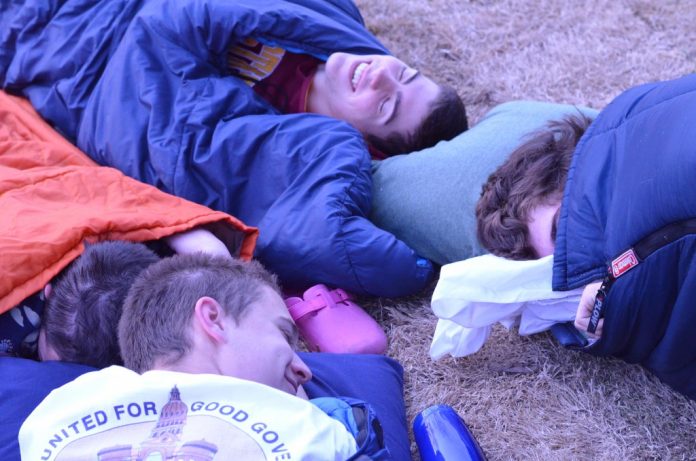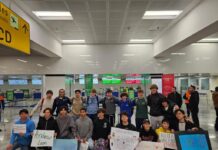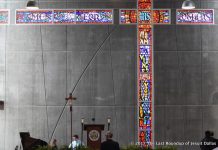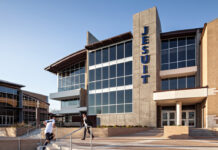At Jesuit, we consistently interact with the poor in community service. We pray for the poor in our daily prayers. We donate food and money to the poor in yearly drives. We feel sorry for the poor when we see them on the side of the road. But do we really know the depth of their suffering, the gravity of their situation, the daily struggle that they experience just to survive? In last week’s poverty immersion trip, nine Jesuit juniors and three faculty members sought to answer this question, experiencing the life of the destitute firsthand.
On Thursday, the 20th of February, the group set off in a school bus for Waco, Texas to participate as part of this years Poverty Immersion Trip. When they arrived in Waco, one of the most poverty stricken cities in Texas, they spent the night in a hotel. The next day, they went to the Baylor University campus to spend time with the Texas Hunger Initiative, learning about poverty and programs combatting it. One particular experience there that Mr. Riemer highlighted was when the group met a woman who worked for the Initiative who grew up in poverty. She brought pictures of her home life when she was in her high school years. Her infinitesimal, indigent household allowed the students to compare her life side by side with their own, and be able to truly count their blessings. Riemer noted that the group was “able to see what it was like for a poor teenager” and how she “made a difference,” before adding that it was “very personal for the guys.”
After their time with the Initiative, they spent the next two days, from Friday night to Sunday morning, experiencing the hardships and struggles that those in poverty are forced to face on a daily basis.
In order to find students to attend the trip, the faculty attending (Mr. Perry, Mr. Riemer, Mr. Ornelas) asked the junior teachers and counselors to provide them with some names of students who might have been interested in attending the special experience. After receiving many names, they started contacting the guys to see who wanted to go. Finally, they got together a group of nine students to accompany them to Waco, all juniors: Austin Hatton, Charlie Eikenburg, Emiliano Gonzalez, Chris Ayres, Matthew Slovak, Tom Weber, Collin Stack, Nico Rodriguez, and Garrett Amy. To make the poverty experience more realistic, these nine split into two smaller groups, each with at least one faculty leader.
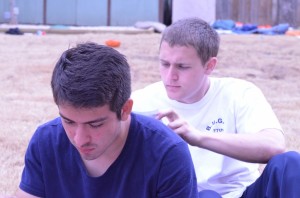 One of the main teachings of Catholicism surrounds the practice of helping the poor, and in Jesuit’s case, being a man for others encompasses that teaching. Spending 16 years living in Waco, Mr. Reimer has spent a lot of his time participating in volunteer work. Being exposed to the troubles surrounding poverty and being a strong believer in the practice of helping those in need, Mr.Reimer thought it would be a humbling and memorable experience to allow students to be exposed to the hardships and struggles of poverty.
One of the main teachings of Catholicism surrounds the practice of helping the poor, and in Jesuit’s case, being a man for others encompasses that teaching. Spending 16 years living in Waco, Mr. Reimer has spent a lot of his time participating in volunteer work. Being exposed to the troubles surrounding poverty and being a strong believer in the practice of helping those in need, Mr.Reimer thought it would be a humbling and memorable experience to allow students to be exposed to the hardships and struggles of poverty.
As part of Mission Waco and in hopes of achieving the life-altering experiences of Mr.Reimer’s goal, the students and faculty participated in the Poverty Simulation that Mission Waco hosts about sixteen times a year. Mr. Perry asserted that the primary goal of the trip was “to immerse ourselves in poverty through a poverty simulation so that the nine Jesuit juniors that attended and the three Jesuit faculty members that attended could come to a better understanding of what poverty and homelessness is really all about.” Upon returning from the trip and having spent “48 hours truly homeless,” the students and faculty believe they more than accomplished their goals.
For the Poverty Simulation program, the main group divided into the two smaller groups to heighten the poverty experience. Their nice clothes were taken from them, and they had to purchase cheap essentials at a local thrift shop. They were left on the streets starting Friday night, and had to fend for themselves. One group, for example, collected cans and brought them to a redemption center, earning $1.67 for their labors. With this meager amount of money, they had to buy lunch for four growing teenage boys and two full grown men.
Mr. Perry recounted the magnitude of this experience, commenting that “our students, through taking that $1.67 and having to gather any dignity that they had left, and having to walk into a convenience store and use $1.67 to purchase saltine crackers and a honeybun and split it six ways. And to be looked at. To be watched by the cashier, by the clerk of the store, because we looked different. It is an experience that causes a person to rapidly mature. To mature in who we are and the attitude that we have towards other people. And to become less judgmental.”
Following this small meal, the six-man party continued to meander through the streets of Waco. Their only sources of water were the scattered public water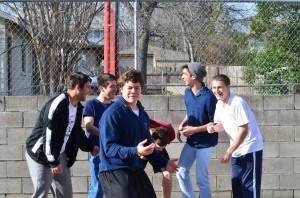 fountains spread across the city. They walked for miles, having only eaten a few crackers and a piece of pastry in the last 24 hours.
fountains spread across the city. They walked for miles, having only eaten a few crackers and a piece of pastry in the last 24 hours.
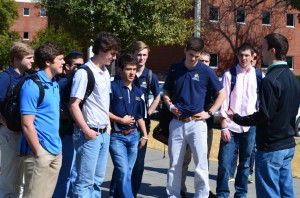 “We were dirty, we smelt bad, we were exhausted, we were very hungry,” said Mr. Perry, but he emphasized that “we were not starving, because there is a big difference between being hungry and being starving. We were just hungry. Starving would be those who are in absolute poverty for a long period of time. And hunger hurts. And that reality became very real for our students.”
“We were dirty, we smelt bad, we were exhausted, we were very hungry,” said Mr. Perry, but he emphasized that “we were not starving, because there is a big difference between being hungry and being starving. We were just hungry. Starving would be those who are in absolute poverty for a long period of time. And hunger hurts. And that reality became very real for our students.”
On Friday and Saturday night, the students of the two groups had to sleep on the streets along with the rest of the homeless of the city. Before starting, they had only been allowed to choose two items to bring. While some had chosen to keep their sleeping bags, others did not, and had to sleep on the patch of grass where the group had decided to make camp for the night. Dealt with only certain limited resources, the students and faculty had to make tough decisions, ordering priorities such as whether to sleep inside or buy dinner.
Mr. Riemer commented that they “got a macro level of understanding by dealing with many problems at the same time and how they all affect each other.”
After their 2-day homeless experience, the group again boarded the school bus, and drove back to Jesuit. Upon returning, Riemer felt that the trip was very effective and plans to hopefully schedule more in the future, maybe even one each semester so that more students can have the unique humbling experience of living in poverty.
Mr. Perry, reflecting on the success of the trip, had this to say to sum up the experience: “Absolutely 110% we achieved the goal. We truly became homeless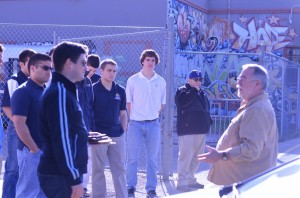 for 48 hours, and we lost our food, shelter, clothing, toiletries. We lost everything…it was very uncomfortable, shocking, but it helped us move from sympathy (because we all feel sympathy for people who are poor and people who are homeless) to empathy. That is so much like Ignatian spirituality. Ignatian spirituality is about a movement of the soul. It is about trying to move from desolation to consolation. This experience was that movement from sympathy to empathy. Sympathy being I feel for you; empathy being I feel with you. I really get your suffering because I have joined your world.”
for 48 hours, and we lost our food, shelter, clothing, toiletries. We lost everything…it was very uncomfortable, shocking, but it helped us move from sympathy (because we all feel sympathy for people who are poor and people who are homeless) to empathy. That is so much like Ignatian spirituality. Ignatian spirituality is about a movement of the soul. It is about trying to move from desolation to consolation. This experience was that movement from sympathy to empathy. Sympathy being I feel for you; empathy being I feel with you. I really get your suffering because I have joined your world.”


